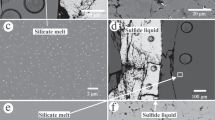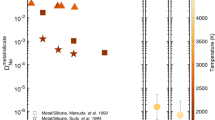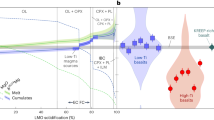Abstract
THE abundances of isotopes in the 238U decay series can be used as both tracers and chronometers of magmatic processes. In the subsolidus asthenosphere, the activity of each daughter isotope (defined as the product of its concentration and decay constant, and denoted by parentheses) is assumed to be equal to that of its parent. By contrast, (230Th/238U) is greater than unity in most recent mid-ocean-ridge and ocean-island basalts1, implying that thorium is more incompatible (that is, it is partitioned into the melt phase more strongly) than uranium. Melting of spinel peridotite cannot produce the (230Th) excesses, because measured partition coefficients for pyroxenes and olivine demonstrate that uranium is more incompatible than thorium for this rock2. Here I report garnet–melt partitioning data which show that for this mineral-melt pair thorium does behave more incompatibly than uranium, thus supporting the suggestion that mid-ocean-ridge basalts (MORB) are produced by melting initiated at depths where garnet is stable3–6. Using these data, I show that the observed (230Th/238U) ratios of MORB and most ocean-island basalts can be explained by slow, near-fractional melting initiated in the garnet stability field.
This is a preview of subscription content, access via your institution
Access options
Subscribe to this journal
Receive 51 print issues and online access
$199.00 per year
only $3.90 per issue
Buy this article
- Purchase on Springer Link
- Instant access to full article PDF
Prices may be subject to local taxes which are calculated during checkout
Similar content being viewed by others
References
Gill, J. B., Pyle, D. M. & Williams, R. W. in Uranium-Series Disequilibrium (eds Ivanovich, M. & Harmon, R. S.) 207–258 (Clarendon, Oxford, 1992).
Beattie, P. D. Earth planet Sci. Lett. (in the press).
Salters, V. J. M. & Hart, S. R. Nature 342, 420–422 (1989).
Johnson, K. T. M., Dick, H. J. B. & Shimizu, N. J. geophys. Res. 95, 2661–2678 (1990).
McKenzie, D. P. & O'Nions, R. K. J. Petrol. 32, 1021–1091 (1991).
White, R. S., McKenzie, D. & O'Nions, R. K. J. geophys. Res. 97, 19683–19715 (1992).
Beattie, P. D. Geochim. cosmochim. Acta 57, 47–55 (1993).
Takahashi, E. J. geophys. Res. 91, 9367–9382 (1986).
Burton, K. W. & O'Nions, R. K. Earth planet. Sci. Lett. 107, 649–671 (1991).
Günther, M. & Jagoutz, E. Fifth Int. Kimberlite Conf. (ext. Abstr.) 122–124 (1991).
Sun, S.-S., Nesbitt, R. W. & Sharaskin, A. Y. Earth planet. Sci. Lett 44, 119–138 (1979).
McKenzie, D. P. Earth planet. Sci. Lett. 72, 149–157 (1985).
Williams, R. W. & Gill, J. B. Geochim. cosmochim. Acta 53, 1607–1619 (1989).
Condomines, M., Morand, P. & Allègre, C. J. Earth planet. Sci. Lett. 55, 247–256 (1981).
Newman, S., Finkel, R. C. & Macdougall, J. D. Earth Planet. Sci. Lett. 65, 17–33 (1983).
Rubin, K. H. & Macdougall, J. D. Nature 335, 158–161 (1988).
Goldstein, S. J., Murrell, M. T. & Janecky, D. R. Earth Planet. Sci. Lett. 96, 134–146 (1989).
Reinitz, I. & Turekian, K. K. Earth Planet. Sci. Letts 94, 199–207 (1989).
Walker, D., Shibata, T. & DeLong, S. E. Contrib. Mineral. Petrol. 70, 111–125 (1979).
Sparkes, D. W. & Parmentier, E. M. Earth planet Sci. Lett 105, 368–377 (1991).
Larson, R. L. & Chase, C. G. Earth planet. Sci. Letts. 7, 425–428 (1970).
Oversby, V. M. & Gast, P. W. Earth planet. Sci. Lett. 5, 199–206 (1968).
Condomines, M., Morand, P., Allègre, C. J. & Sigvaldasson, G. Earth planet Sci. Lett. 55, 393–406 (1981).
Krishnaswami, S., Turekian, K. K. & Bennett, J. T. Geochim. cosmochim. Acta 48, 505–511 (1984).
Newman, S., Finkel, R. C. & Macdougall, J. D. Geochim. cosmochim. Acta 48, 315–324 (1984).
Hemond, C. H. et al. Earth planet. Sci. Lett. 87, 273–285 (1988).
Condomines, M., Bernat, M. & Allègre, C. J. Earth planet. Sci. Lett. 33, 122–125 (1976).
Reinitz, I. & Turekian, K. K. Geochim. cosmochim. Acta 55, 3735–3740 (1991).
Williams, R. W. & Gill, J. B. Geophys. Res. Lett. 19, 139–142 (1992).
Watson, S. & McKenzie, D. J. Petrol. 32, 501–537 (1991).
Author information
Authors and Affiliations
Rights and permissions
About this article
Cite this article
Beattie, P. Uranium–thorium disequilibria and partitioning on melting of garnet peridotite. Nature 363, 63–65 (1993). https://doi.org/10.1038/363063a0
Received:
Accepted:
Issue Date:
DOI: https://doi.org/10.1038/363063a0
This article is cited by
-
The involvement of deep plume-related materials in the South Atlantic Ocean asthenosphere as indicated by isotopic independent component analysis of basalts
International Journal of Earth Sciences (2023)
-
Clinopyroxene/liquid trace element partitioning in natural trachyte–trachyphonolite systems: insights from Campi Flegrei (southern Italy)
Contributions to Mineralogy and Petrology (2009)
-
Melting of the Earth's lithospheric mantle inferred from protactinium– thorium–uranium isotopic data
Nature (2000)
-
Hot stuff under southern Chile
Nature (1998)
-
Melting of a subducting oceanic crust from U–Th disequilibria in austral Andean lavas
Nature (1998)
Comments
By submitting a comment you agree to abide by our Terms and Community Guidelines. If you find something abusive or that does not comply with our terms or guidelines please flag it as inappropriate.



